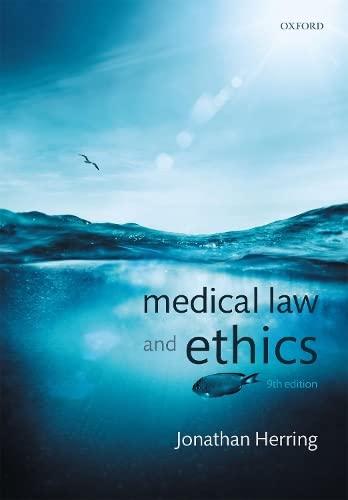Question
ANSWER ALL THE QUESTIONS Question 20 Is it necessary to put all type 2 diabetics on aspirin? Question 21 In the chapter on diabetes you
ANSWER ALL THE QUESTIONS
Question 20 Is it necessary to put all type 2 diabetics on aspirin? Question 21 In the chapter on diabetes you wrote that you
tablets before age of 40 years in non-insulin-dependent diabetes mellitus (NIDDM). Why is this, because in our country most doctors are prescribing this? Question 22 1. Should a patient poorly controlled on glibenclamide 15 mg a day and 1500 mg a day be moved onto insulin? 2. What are the indications for insulin in type 2 diabetics? Question 23 What happens to the insulin-secreting capacity of a type 2 diabetic placed on insulin therapy earlier than recommended? Can the external supply of insulin improve the functional capacity of the insulin-secreting cells, to some extent by providing some rest to these cells? Question 24 1. Is inhaled insulin a suitable substitute for injectable insulin? 2. Is there, or will there soon be, insulin in the form of a tablet? Question 25 What are the complications of insulin other than hypoglycaemia and injection? Question 26 I would like to know the processes that go into administering the Alberti's/modified Alberti's regime in patients with uncontrolled diabetes mellitus. Diabetes mellitus and other disorders of metabolism 19 201 Question 27 Is there any role for steroids in the management of resistant diabetes mellitus (daily insulin requirement exceeding 100 units/day)? Don't they make glycaemic control worse? Question 28 What is the importance of potassium chloride (KCl) in the treatment of a diabetic patient (pre-operative care)? The formula in the text is explained as 16 U of insulin 10 mmol of KCl 500 mL 10% glucose. Question 29 What is the cut-off point of daily albumin excretion above which a diabetic patient without hypertension should be given an angiotensinconverting enzyme (ACE) inhibitor? Question 30 What is the urinary concentration or 24-hour urine albumin content above which angiotensin-converting enzyme (ACE) inhibitors should be started in diabetic patients? Does an albumin (in microgram)/creatinine (in milligrams) ratio above 30 in the morning sample indicate a need for this? Question 31 Do potassium channel activators such as nicorandil have any benefit in the treatment of a diabetic patient with cardiovascular complications? Question 32 Is a dosage of 2.5 mg/day of methyltestosterone, as a component in some multivitamin formulae, safe to give to diabetics or will it make the diabetes more difficult to control (see also Chapter 5, question 5)? Question 33 How does diabetes mellitus cause atherosclerosis? Question 34 How does diabetes cause renal damage, especially diabetic nephropathy with the presence of microalbuminuria? Question 35 Type 1 diabetes causes nephropathy in 40% of cases and type 2 causes it in 20% of cases but the most common cause of nephropathy we see is type 2, why? Question 36 Why is intractable vomiting seen in diabetes mellitus and how can it be managed? 19 Diabetes mellitus and other disorders of metabolism 202 Question 37 Is gabapentin superior to carbamazepine in terms of efficacy in the treatment of painful diabetic neuropathy? What are its side-effects? Question 38 Why is diabetic ketoacidosis more common in type 1 diabetes? Question 39 Why is there abdominal pain in diabetic ketoacidosis? Question 40 Grades of ketonuria are sometimes mentioned. I have not been able to locate a detailed description in textbooks and would be grateful if you could explain the grades of ketonuria or recommend suitable reading material. Question 41 What false-positive factors could cause ketone bodies to appear in the urine in a non-diabetic patient? Question 42 Why is tetanus not seen in a diabetic foot wound? Question 43 Can impaired glucose tolerance cause recurrent lower motor facial palsy? Question 44 Can long-term diabetes mellitus cause vertigo not accompanied by other brainstem signs? Question 45 We know that type 2 diabetes mellitus provokes left ventricular diastolic dysfunction. Does chronic stable angina, associated with type 2 diabetes mellitus, further increase the prevalence of left ventricular diastolic dysfunction? Question 46 Is there adequate evidence for choosing an angiotensin-converting enzyme (ACE) inhibitor or antagonist for the initial management of raised blood pressure in type 2 diabetes, or is it now advisable to choose any tolerated antihypertensive? Question 47 Why is there immunosuppression in diabetes? Diabetes mellitus and other disorders of metabolism 19 203 Question 48 Dextrose infusion in quinine induced hypoglycaemia causes more hypoglycaemia, so what is to be used? Question 49 Does the serum cholesterol level rise with age? Question 50 Please explain the significance of having normal total high-density lipoprotein (HDL) and low-density lipoprotein (LDL) cholesterol but a raised lipoprotein (a) [Lp(a)] in a normotensive, non-smoking patient
Step by Step Solution
There are 3 Steps involved in it
Step: 1

Get Instant Access to Expert-Tailored Solutions
See step-by-step solutions with expert insights and AI powered tools for academic success
Step: 2

Step: 3

Ace Your Homework with AI
Get the answers you need in no time with our AI-driven, step-by-step assistance
Get Started


